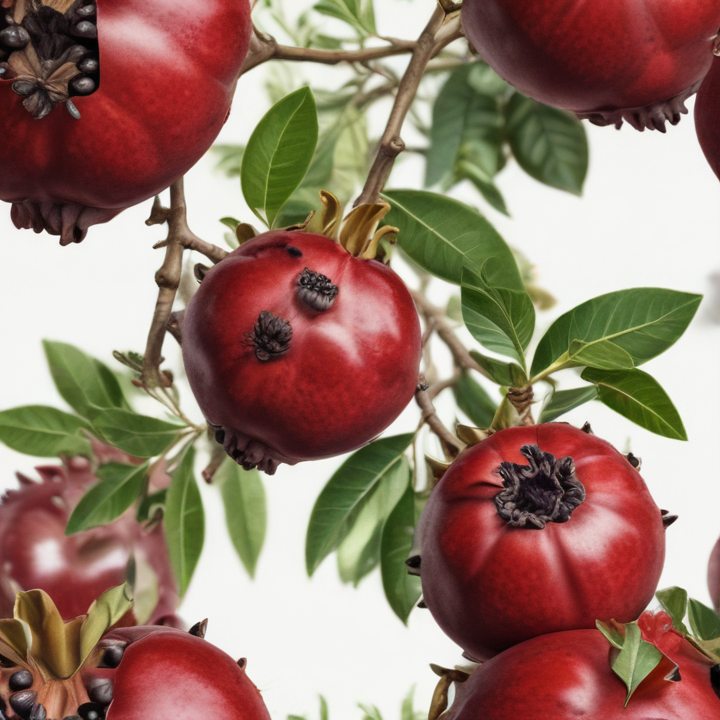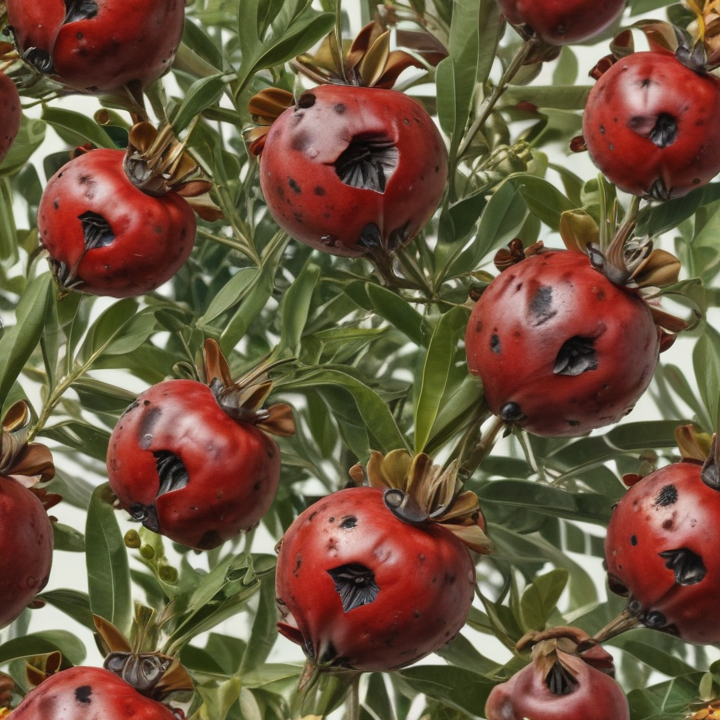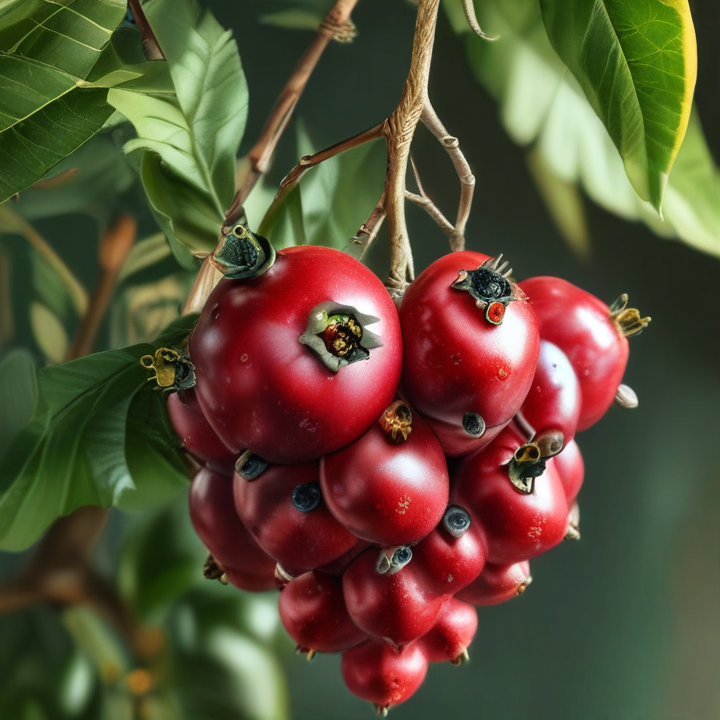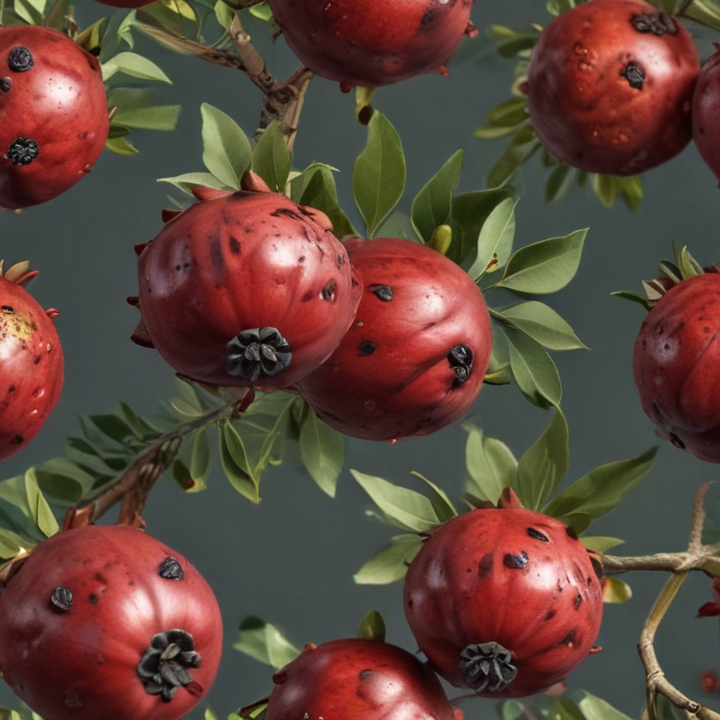granaatõuna mahl Safety Certifications
Granaatõuna mahl, renowned for its health benefits, is generally produced adhering to various safety and quality certifications to ensure consumer safety and product quality. Here are some key certifications and standards typically associated with granaatõuna mahl:
1. Organic Certification: Many granaatõuna mahla brands, such as JardinBio, boast organic certifications indicating that the product is made from organically grown pomegranates without synthetic pesticides or fertilizers.
2. HACCP (Hazard Analysis and Critical Control Points): This is a systematic preventive approach to food safety that addresses physical, chemical, and biological hazards as a means of prevention rather than finished product inspection. This certification ensures the product is processed under safe and hygienic conditions.
3. ISO 22000: This is a global standard specifying the requirements for a food safety management system. It ensures the safe production, handling, preparation, and storage of food, including granaatõuna mahl, to ensure it is safe for consumption.
4. Kosher and Halal Certifications: Some granaatõuna mahl products may carry these certifications, indicating they meet the dietary laws and cleanliness standards of these religions, making them suitable for consumption by Jewish and Muslim communities respectively.
5. Non-GMO Certification: This certifies that the product is made without genetically modified organisms, appealing to consumers seeking natural products.
These certifications help ensure that granaatõuna mahl is produced, processed, and handled in ways that maintain its safety, quality, and nutritional value. Always look for these certifications on product labels to ensure the highest standards of food safety and quality.
List Reference Technical Parameters of "granaatõuna mahl"
"Granaatõuna mahl" translates to "pomegranate juice" in English. Here are the reference technical parameters for pomegranate juice:
Chemical Composition:
1. Sugars: Predominantly fructose and glucose, approximately 10-15 g per 100 ml.
2. Organic Acids: Mainly citric acid, with minor amounts of malic acid, contributing to the juice's tartness.
3. Polyphenols: High in antioxidants, particularly punicalagins, ellagic acid, and anthocyanins.
4. Vitamins: Notable levels of Vitamin C, Vitamin K, and some B vitamins like folate.
5. Minerals: Contains potassium, magnesium, and minor amounts of calcium and iron.
Physical Properties:
1. Color: Deep red due to anthocyanins and other polyphenols.
2. pH: Typically ranges from 2.9 to 3.2, indicating high acidity.
3. Brix: Total soluble solids (sugar content) usually between 14-18 °Brix.
4. Density: Approximately 1.05 g/ml at room temperature.
5. Viscosity: Low to medium, comparable to other fruit juices.
Microbiological Parameters:
1. Standard Plate Count: Should be minimal in pasteurized products, typically less than 10^3 CFU/ml.
2. Yeasts and Molds: Less than 10 CFU/ml in pasteurized juice.
3. Coliforms: Absence in pasteurized products, indicating good sanitary practices.
Processing Parameters:
1. Pasteurization: Often pasteurized at 85-90°C for a few seconds to ensure microbial safety while retaining most nutrients.
2. Clarification: May undergo centrifugation or filtration to remove pulp and sediment.
3. Storage Conditions: Best stored at 0-4°C to preserve freshness and nutritional quality.
Sensory Attributes:
1. Flavor: Characteristic sweet-tart balance, with a slightly astringent aftertaste due to tannins.
2. Aroma: Fruity and somewhat earthy, indicative of fresh pomegranate.
Packaging:
1. Containers: Commonly packaged in glass bottles, PET bottles, or Tetra Pak cartons to prevent light and oxygen exposure.
2. Shelf Life: Typically around 6-12 months when unopened and stored properly; 3-5 days after opening and refrigerated.
These parameters ensure that pomegranate juice maintains its nutritional quality, safety, and sensory attributes.
List Product features of "granaatõuna mahl"
Granaatõuna mahl, or pomegranate juice, is a popular beverage known for its health benefits and unique flavor profile. Here are its key product features:
Nutritional Benefits
1. Rich in Antioxidants: Pomegranate juice is loaded with antioxidants, particularly polyphenols, which help combat oxidative stress and inflammation.
2. High Vitamin Content: It is an excellent source of vitamins C, K, and several B vitamins, which are essential for various bodily functions.
3. Minerals: Contains essential minerals such as potassium, which supports heart health, and iron, crucial for oxygen transport in the blood.
Health Benefits
4. Heart Health: Regular consumption can improve heart health by lowering blood pressure, reducing cholesterol levels, and improving blood flow.
5. Anti-Inflammatory Properties: The antioxidants in pomegranate juice help reduce inflammation, which is beneficial for conditions like arthritis.
6. Cancer Prevention: Some studies suggest that pomegranate juice may help inhibit the growth of cancer cells, particularly in prostate and breast cancers.
Flavor and Consumption
7. Unique Flavor: It has a tart and slightly sweet taste, making it a refreshing drink on its own or a versatile ingredient in smoothies, cocktails, and culinary recipes.
8. Natural Sweetener: Often used as a natural sweetener in dishes and beverages due to its natural sugars and rich flavor profile.
Quality and Purity
9. 100% Juice: High-quality pomegranate juice is often marketed as 100% pure juice, without added sugars, preservatives, or artificial colors.
10. Organic Options: Many brands offer organic pomegranate juice, free from pesticides and genetically modified organisms (GMOs).
Packaging and Availability
11. Convenient Packaging: Available in various packaging options, including glass bottles, cartons, and single-serve packs, making it convenient for different consumption needs.
12. Shelf Life: Generally has a good shelf life when unopened and stored properly, though it should be consumed shortly after opening for the best flavor and nutritional value.
Sustainability
13. Eco-Friendly Packaging: Some brands focus on sustainable packaging options, such as recyclable bottles or cartons, to reduce environmental impact.
14. Ethically Sourced: Ethically sourced pomegranate juice ensures fair trade practices and supports local farming communities.
Pomegranate juice stands out for its combination of health benefits, unique flavor, and quality, making it a preferred choice for health-conscious consumers.
List Various Types of "granaatõuna mahl"
"Granaatõuna mahl" translates to pomegranate juice in Estonian. Various types of pomegranate juice are available, each offering unique qualities based on processing methods, additional ingredients, and packaging. Here are some types:
1. Pure Pomegranate Juice
- Freshly Squeezed: Made from fresh pomegranates without any additives or preservatives.
- Cold-Pressed: Extracted using a hydraulic press to preserve nutrients and flavor.
- Pasteurized: Heat-treated to extend shelf life, often found in supermarkets.
2. Blended Pomegranate Juice
- Mixed with Other Fruits: Combined with juices like apple, grape, or orange to balance tartness.
- Vegetable Blends: Mixed with vegetable juices like beetroot or carrot for added nutritional benefits.
3. Concentrated Pomegranate Juice
- Juice Concentrate: Water is removed from the juice, making it easier to transport and store. Requires dilution before consumption.
- Frozen Concentrate: Stored and sold frozen, requires reconstitution with water.
4. Organic Pomegranate Juice
- Certified Organic: Made from pomegranates grown without synthetic pesticides or fertilizers, ensuring a more natural product.
5. Functional Pomegranate Juice
- Fortified: Enriched with vitamins, minerals, or other nutrients to enhance health benefits.
- Probiotic-Infused: Contains added probiotics for digestive health.
6. Fermented Pomegranate Juice
- Kombucha: A fermented tea made with pomegranate juice, offering probiotic benefits.
- Alcoholic Beverages: Includes pomegranate wine or cider.
7. Sparkling Pomegranate Juice
- Carbonated: Pomegranate juice with added carbonation for a fizzy, refreshing drink.
8. Ready-to-Drink Pomegranate Juice
- Bottled or Canned: Conveniently packaged for immediate consumption, available in various sizes and formulations.
Each type caters to different preferences and health goals, offering a wide range of options for pomegranate juice enthusiasts.
List Application of "granaatõuna mahl"
"Granaatõuna mahl" is Estonian for pomegranate juice, a beverage known for its vibrant flavor and numerous health benefits. Here are several applications of pomegranate juice:
1. Health Benefits:
- Antioxidant Properties: Pomegranate juice is rich in antioxidants, particularly punicalagins and anthocyanins, which help protect cells from damage by free radicals.
- Heart Health: Regular consumption may improve heart health by reducing blood pressure, lowering bad cholesterol (LDL), and improving overall cholesterol levels.
- Anti-Inflammatory Effects: The anti-inflammatory properties can help reduce chronic inflammation, which is linked to various diseases such as arthritis and certain cancers.
2. Culinary Uses:
- Beverages: Pomegranate juice can be enjoyed on its own, mixed into cocktails, smoothies, or used as a base for other beverages.
- Cooking: It can be used as a marinade for meats, adding a unique flavor and tenderizing the meat. It's also used in salad dressings and sauces.
- Desserts: Incorporate it into desserts like sorbets, jellies, and fruit salads for a refreshing taste.
3. Skincare:
- Topical Application: Pomegranate juice, rich in vitamins C and E, can be used in skincare products for its anti-aging properties. It helps in cell regeneration, reducing wrinkles, and providing a natural glow.
- DIY Masks: Combine pomegranate juice with other natural ingredients like honey or yogurt to create nourishing face masks.
4. Dietary Supplement:
- Nutritional Boost: It can be consumed as a supplement to provide essential nutrients like vitamin C, potassium, and folate, supporting overall health.
5. Cultural and Traditional Uses:
- Symbolic Significance: In many cultures, pomegranate juice is used in rituals and traditional medicine for its believed healing properties and as a symbol of fertility and prosperity.
Pomegranate juice is versatile, offering a range of health benefits, culinary uses, skincare applications, and cultural significance.
List Buyer Types of "granaatõuna mahl"
"Granaatõuna mahl," or pomegranate juice, appeals to a diverse range of buyers, each motivated by different factors. Here are the primary buyer types:
1. Health-Conscious Consumers: These individuals prioritize their well-being and are attracted to pomegranate juice for its high antioxidant content, vitamins, and potential health benefits, such as improved heart health and anti-inflammatory properties.
2. Fitness Enthusiasts: Often involved in regular physical activity, this group seeks out pomegranate juice for its reputed ability to enhance exercise performance, reduce muscle soreness, and support overall recovery.
3. Natural Product Seekers: Consumers looking for natural and organic products prefer pomegranate juice because it is typically free from artificial additives and preservatives, aligning with their preference for natural and minimally processed foods.
4. Gourmet and Culinary Enthusiasts: This segment includes individuals who enjoy experimenting with flavors and incorporating unique ingredients into their recipes. Pomegranate juice is valued for its distinct taste, which can enhance both sweet and savory dishes.
5. Parents and Families: Parents often choose pomegranate juice for their children due to its nutritional benefits. It serves as a healthier alternative to sugary drinks, providing essential nutrients in a flavorful way.
6. Elderly Consumers: Older adults may opt for pomegranate juice for its potential benefits in managing age-related health issues, such as high blood pressure and cognitive decline.
7. Ethnic and Cultural Consumers: In some cultures, pomegranate juice holds traditional significance and is a staple in various dishes and beverages. This group purchases it to maintain cultural and culinary traditions.
8. Environmental and Ethical Consumers: Those concerned with sustainability and ethical sourcing are drawn to pomegranate juice brands that emphasize fair trade practices, eco-friendly packaging, and sustainable farming methods.
These diverse buyer types ensure a broad market for pomegranate juice, driven by health benefits, taste preferences, cultural significance, and ethical considerations.
List "granaatõuna mahl" Project Types for Different Industries
Project Types for "Granaatõuna Mahl" (Pomegranate Juice) Across Different Industries
1. Food and Beverage Industry:
- Product Development: Creating new pomegranate juice flavors and formulations.
- Quality Assurance: Implementing rigorous testing protocols to ensure product consistency and safety.
- Packaging Design: Developing eco-friendly and attractive packaging solutions.
- Supply Chain Management: Optimizing sourcing and logistics for fresh pomegranates.
- Market Research: Analyzing consumer preferences and market trends to inform product strategies.
2. Agriculture Industry:
- Cultivation Projects: Implementing best practices for growing pomegranate trees, including soil health and irrigation management.
- Sustainability Initiatives: Developing methods to reduce water usage and improve eco-friendly farming techniques.
- Pest and Disease Control: Researching and applying effective pest and disease management strategies.
- Harvesting Techniques: Innovating efficient and cost-effective harvesting methods.
3. Health and Wellness Industry:
- Nutritional Research: Studying the health benefits of pomegranate juice and its components.
- Product Certification: Obtaining certifications such as organic, non-GMO, and fair trade.
- Functional Beverage Development: Creating pomegranate juice-based drinks that offer specific health benefits, like antioxidant-rich blends.
4. Biotechnology Industry:
- Extraction Techniques: Developing advanced methods for extracting juice and beneficial compounds from pomegranates.
- Bioactive Compounds Research: Investigating the pharmacological properties of pomegranate compounds for potential health applications.
- Fermentation Projects: Exploring the creation of fermented pomegranate products with enhanced health benefits.
5. Retail Industry:
- Distribution Strategy: Planning and executing the distribution of pomegranate juice to various retail channels.
- E-commerce Development: Building and optimizing online platforms for direct-to-consumer sales.
- Merchandising and Display: Designing effective in-store displays and promotional materials to boost sales.
6. Environmental and Social Projects:
- Waste Management: Developing systems to minimize waste during the juice extraction process and repurposing by-products.
- Community Engagement: Implementing fair trade practices and supporting local farming communities.
- Carbon Footprint Reduction: Initiatives to lower the carbon footprint of production and distribution processes.
These project types illustrate the diverse applications and opportunities for "granaatõuna mahl" across various industries, driving innovation and sustainability.
granaatõuna mahl Accessories Upgrades and Custom Manufacturing Options
Granaatõuna mahl (pomegranate juice) production equipment offers various accessories, upgrades, and custom manufacturing options to enhance efficiency, quality, and functionality. Here’s a breakdown of these options:
Accessories:
1. Juice Extractors: High-efficiency extractors designed to maximize juice yield from pomegranates.
2. Filters and Sieves: Various filter mesh sizes for removing seeds and pulp to achieve desired juice clarity.
3. Pasteurizers: Equipment to pasteurize juice, extending shelf life while maintaining nutritional quality.
4. Bottling Units: Automated bottling lines that include rinsing, filling, and capping functions.
5. Labeling Machines: High-speed labeling machines to customize product branding.
Upgrades:
1. Automation Systems: Integrate programmable logic controllers (PLCs) for automated control of the production process, reducing labor costs and increasing precision.
2. Advanced Filtration Systems: Upgrade to multi-stage filtration systems for superior juice clarity and quality.
3. Cooling Systems: Enhance cooling systems for better temperature control during processing, ensuring freshness and flavor retention.
4. Energy-Efficient Motors: Retrofit existing equipment with energy-efficient motors to reduce power consumption.
5. High-Capacity Storage Tanks: Larger storage tanks to handle increased production volumes.
Custom Manufacturing Options:
1. Tailored Design: Custom design and fabrication services to meet specific production requirements and space constraints.
2. Material Choices: Selection of materials like stainless steel or food-grade plastics depending on hygiene and budgetary needs.
3. Capacity Customization: Manufacturing equipment tailored to specific production capacities, from small-scale artisanal setups to large industrial operations.
4. Integration with Existing Systems: Custom solutions to seamlessly integrate new equipment with existing production lines.
5. Mobile Units: Custom mobile juice processing units for on-site production and versatility.
These accessories, upgrades, and custom manufacturing options allow producers to optimize their granaatõuna mahl production, ensuring high-quality output and operational efficiency tailored to their specific needs.
List Quality Control and The Manufacturing Process of "granaatõuna mahl"
Quality Control and Manufacturing Process of "Granaatõuna Mahl" (Pomegranate Juice)
1. Raw Material Selection:
Quality control begins with selecting high-quality pomegranates. They should be ripe, free of diseases, and have a high juice content. Suppliers are vetted to ensure they meet specific agricultural standards.
2. Cleaning and Inspection:
Pomegranates undergo thorough washing to remove dirt, pesticides, and microorganisms. Automated systems and manual inspections help identify and discard any defective fruits.
3. Extraction:
The arils (seeds) are separated from the peel. This can be done using manual or automated methods. The seeds are then pressed to extract the juice. Cold pressing is often preferred to preserve nutrients and flavor.
4. Filtration:
The extracted juice is filtered to remove pulp and seed fragments. Fine filtration ensures a smooth texture and clarity, enhancing the juice's aesthetic and sensory qualities.
5. Pasteurization:
To ensure safety and extend shelf life, the juice undergoes pasteurization. This involves heating the juice to a specific temperature for a set time to kill pathogens while preserving nutritional value.
6. Quality Control Testing:
Throughout the process, samples are tested for pH, sugar content (Brix level), microbial contamination, and sensory attributes like taste, color, and aroma. Any batch failing to meet standards is reprocessed or discarded.
7. Blending and Standardization:
Juices from different batches may be blended to achieve a consistent flavor and quality. Standardization ensures uniform taste, color, and nutritional content across all production runs.
8. Bottling and Packaging:
The juice is filled into sterilized bottles under aseptic conditions. Packaging materials are selected for their ability to protect the juice from light and air, which can degrade quality.
9. Labeling and Distribution:
Bottles are labeled with product information, including expiration dates. Final inspections ensure proper sealing and labeling before the juice is distributed.
10. Post-Production Quality Control:
Random samples from the production batch are stored and monitored over time to ensure they maintain quality throughout their shelf life.
Conclusion:
Quality control in the manufacturing of "granaatõuna mahl" involves stringent checks at each stage, from raw material selection to post-production, ensuring a safe, nutritious, and high-quality product.
How to use "granaatõuna mahl"
"Granaatõuna mahl," or pomegranate juice, is a versatile and nutritious ingredient that can be used in various ways:
1. Drinking: Enjoy it as a refreshing beverage on its own or diluted with water for a lighter taste. Serve it chilled or over ice.
2. Smoothies: Add pomegranate juice to smoothies for a tangy flavor and nutritional boost. Combine it with fruits like berries, bananas, and yogurt.
3. Cooking:
- Marinades: Use pomegranate juice as a base for marinades for meats such as chicken, pork, or lamb. It adds a sweet and tart flavor.
- Sauces: Create a reduction sauce by simmering pomegranate juice with sugar or honey until thickened. This pairs well with roasted meats and vegetables.
- Salad Dressings: Mix pomegranate juice with olive oil, vinegar, and seasonings for a fruity salad dressing.
4. Baking: Incorporate pomegranate juice into baked goods like muffins, cakes, or bread for a unique twist. Replace some of the liquid in recipes with pomegranate juice.
5. Desserts:
- Jellies and Puddings: Use pomegranate juice to make jellies, puddings, or fruit compotes.
- Sorbet: Freeze pomegranate juice with sugar and a bit of lemon juice to make a refreshing sorbet.
6. Cocktails: Mix pomegranate juice with spirits like vodka, gin, or champagne to create vibrant cocktails. Garnish with pomegranate seeds for extra flair.
7. Health Boost: Add pomegranate juice to your diet for its antioxidants and vitamins. Drink it daily or add it to herbal teas for extra benefits.
Experiment with these ideas to make the most of granaatõuna mahl in your kitchen.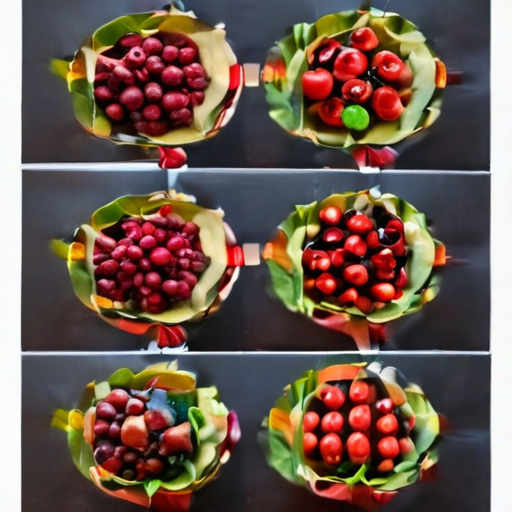
"granaatõuna mahl" Comparative Analysis
Comparative Analysis of "Granaatõuna Mahl" (Pomegranate Juice)
Pomegranate juice, known as "granaatõuna mahl" in Estonian, has garnered significant attention due to its extensive health benefits and rich nutritional profile. This analysis compares its attributes, health impacts, and considerations for consumption.
#### Nutritional and Health Benefits
Pomegranate juice is rich in vitamins A, C, E, and folic acid. It also contains high levels of antioxidants such as flavonoids, which help neutralize free radicals, potentially reducing the risk of various cancers, including prostate and breast cancer. The juice is beneficial for heart health, aiding in the prevention of heart attacks and strokes by improving blood circulation and preventing the formation of arterial clots.
Regular consumption of pomegranate juice supports dental health due to its antibacterial properties, which help reduce plaque and protect against various oral diseases. Additionally, the juice can aid in managing conditions such as osteoarthritis by inhibiting enzymes that cause joint wear. It is also effective in treating anemia by supplying the body with iron, thereby reducing symptoms like fatigue and weakness.
#### Therapeutic Uses and Precautions
Historically, pomegranate has been used for its medicinal properties. Avicenna and Hippocrates both recommended its use for digestive issues and wound healing. However, its high acidity can be problematic for individuals with sensitive teeth or high gastric acidity, making it unsuitable for some people. Moreover, pomegranate is considered allergenic and should be consumed with caution by those with allergies.
#### Consumer Preferences
Consumer reviews highlight that natural, 100% pomegranate juice is highly favored for its authentic taste and health benefits, despite being more expensive compared to juices made from concentrate. The natural juice is appreciated for its effectiveness in treating conditions like anemia and for its refreshing taste.
#### Conclusion
Pomegranate juice stands out for its extensive health benefits, ranging from cancer prevention and heart health to dental care and joint protection. However, its high acidity and potential allergenicity necessitate cautious consumption. Despite its higher cost, 100% natural pomegranate juice is preferred for its superior health benefits and natural taste.
For more detailed information, you can refer to sources such as Maakodu and Postimees.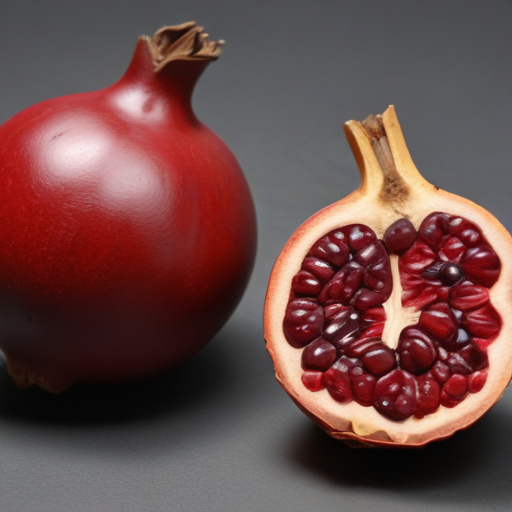
"granaatõuna mahl" Warranty and Support
Warranty and Support for Granaatõuna Mahl
Warranty:
Granaatõuna Mahl offers a limited warranty on all its products to ensure customer satisfaction and product reliability. The warranty period extends for 12 months from the date of purchase and covers defects in materials and workmanship. During this period, if the product fails due to manufacturing defects, Granaatõuna Mahl will repair or replace the product at no additional cost to the customer.
Exclusions:
The warranty does not cover:
- Damage caused by misuse, abuse, or accidents.
- Normal wear and tear.
- Products that have been altered or repaired by unauthorized personnel.
- Damage resulting from failure to follow the product instructions or safety guidelines.
How to Claim Warranty:
To claim warranty service, customers must:
1. Provide proof of purchase (receipt or invoice).
2. Contact Granaatõuna Mahl's customer service via email or phone.
3. Describe the issue and, if required, provide photos of the defect.
4. Follow the instructions given by the support team for product return or service.
Support:
Granaatõuna Mahl is committed to providing exceptional customer support. Our dedicated support team is available to assist with any inquiries or issues related to our products. Customers can reach out through the following channels:
- Email: [email protected]
- Phone: +372 123 4567
- Live Chat: Available on our website from 9 AM to 6 PM, Monday to Friday.
Additional Resources:
- FAQ Section: Visit our website’s FAQ section for answers to common questions.
- User Manuals: Downloadable user manuals and guides are available on our website.
- Tutorials: Access video tutorials for product setup and maintenance.
Granaatõuna Mahl strives to ensure that every customer has a positive experience with our products and services. Our warranty and support services are designed to provide peace of mind and prompt assistance whenever needed.
List "granaatõuna mahl" FAQ
FAQ on "Granaatõuna mahl" (Pomegranate Juice)
#### What is "Granaatõuna mahl"?
"Granaatõuna mahl" is pomegranate juice, a beverage made from the fruit of the pomegranate (Punica granatum).
#### What are the health benefits of pomegranate juice?
Pomegranate juice is rich in antioxidants, vitamins (especially vitamin C), and minerals. It may help reduce inflammation, lower blood pressure, improve cholesterol levels, and provide anti-cancer benefits.
#### How should I store pomegranate juice?
Store unopened bottles in a cool, dark place. Once opened, refrigerate and consume within a few days to a week for the best quality and freshness.
#### Can pomegranate juice interact with medications?
Yes, pomegranate juice can interact with certain medications, particularly those metabolized by the liver. Always consult with a healthcare provider if you are on medication before adding pomegranate juice to your diet.
#### Is pomegranate juice safe during pregnancy?
Pomegranate juice is generally considered safe during pregnancy, but it's always best to consult with a healthcare provider. It provides essential nutrients beneficial for both mother and baby.
#### How is pomegranate juice made?
Pomegranate juice is made by pressing or crushing the arils (seed sacs) of the pomegranate fruit. It can be made at home or purchased pre-packaged.
#### Is pomegranate juice high in sugar?
Pomegranate juice contains natural sugars. While it’s nutritious, it should be consumed in moderation, especially by individuals managing blood sugar levels.
#### Can pomegranate juice help with weight loss?
Pomegranate juice can be part of a balanced diet but should not be relied on solely for weight loss. Its antioxidants may support overall health, but it's important to pair it with a healthy diet and regular exercise.
#### What are the culinary uses of pomegranate juice?
Pomegranate juice can be used in smoothies, cocktails, salad dressings, marinades, sauces, and desserts, adding a tangy and sweet flavor.
#### Are there any side effects of drinking pomegranate juice?
While generally safe, some people might experience allergic reactions, gastrointestinal discomfort, or interactions with certain medications. Always consume in moderation and consult a healthcare provider if in doubt.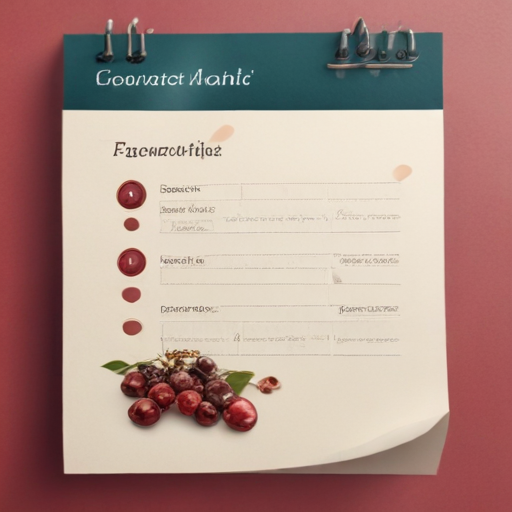
Top 10 FAQ with answer about granaatõuna mahl for Buyer Sourcing from China
Top 10 FAQs about Sourcing Pomegranate Juice from China
1. What quality standards should I look for in pomegranate juice?
Ensure the supplier complies with international quality standards such as ISO, HACCP, and certifications like USDA Organic or EU Organic.
2. How can I verify the authenticity and quality of the pomegranate juice?
Request samples for lab testing and ask for a Certificate of Analysis (COA) and third-party testing reports to verify quality and authenticity.
3. What is the typical lead time for an order?
Lead times can vary but generally range from 20-45 days, depending on the order size and specific requirements.
4. What are the minimum order quantities (MOQ) generally required?
MOQs vary by supplier, but a typical range is between 500 to 1,000 liters. Some suppliers might offer flexibility for initial orders.
5. What are the common packaging options available?
Pomegranate juice can be packaged in bulk containers (totes or drums), bottles, tetra packs, or customized packaging based on buyer specifications.
6. Can the juice be customized to meet specific needs?
Yes, many suppliers offer customization options, including organic certification, different concentrations, and tailored packaging.
7. What are the payment terms usually offered by suppliers?
Common payment terms include a 30% deposit upfront and the remaining balance before shipment. Payment methods often accepted are T/T (Telegraphic Transfer) and L/C (Letter of Credit).
8. How can I ensure the supplier is reliable?
Conduct due diligence by checking the supplier’s business license, references, and reviews. Utilizing third-party inspection services can also ensure reliability.
9. What are the import duties and regulations for pomegranate juice?
Import duties and regulations vary by country. Check with your local customs office or a freight forwarder for specific details regarding HS codes and tariff rates.
10. What are the shipping options and costs?
Shipping options include sea freight (most cost-effective for large quantities) and air freight (faster but more expensive). Costs depend on the shipment volume, weight, and destination.
These FAQs cover essential aspects to consider when sourcing pomegranate juice from China, ensuring you make informed and confident purchasing decisions.

